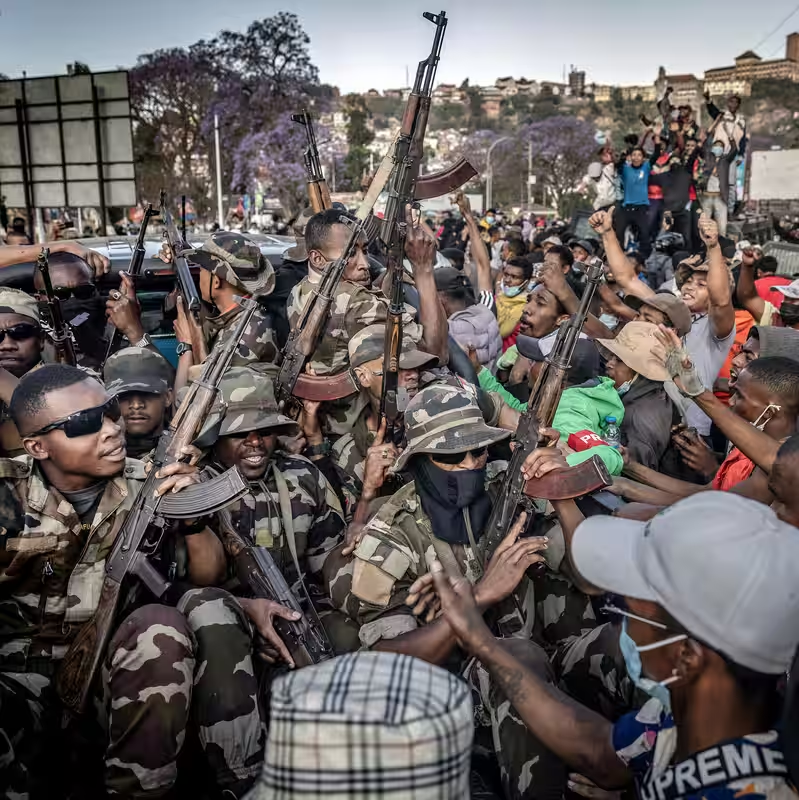Table of Contents
- Crisis Escalates as Military Unit Joins Protesters
- Roots of the Unrest: From Power Cuts to Political Fury
- The Army Defection That Changed Everything
- Rajoelina’s Response: Denial, Promises, and a One-Year Ultimatum
- International Concern Mounts
- What Happens Next?
- Sources
Coup Fears Rise in Madagascar as Army Unit Joins Protesters
In a dramatic turn of events that has sent shockwaves across the Indian Ocean island, a key Madagascar military unit has broken ranks and publicly sided with anti-government demonstrators—raising serious fears of an imminent coup.
The unit, known as CAPSAT, released a viral video on Saturday calling on fellow security forces to “refuse to be paid to shoot our friends, our brothers, our sisters.” Their bold declaration marks a dangerous escalation in over two weeks of nationwide protests that began over basic services but have now morphed into a full-blown political crisis.
Roots of the Unrest: From Power Cuts to Political Fury
What started as frustration over chronic electricity and water shortages quickly spiraled into mass demonstrations against President Andry Rajoelina’s leadership. Protesters—largely young, urban, and fed up—have taken to the streets of Antananarivo chanting slogans against corruption, poor governance, and economic stagnation.
According to the United Nations, nearly two dozen people have died in clashes with security forces, though Madagascar’s government disputes this toll. Videos circulating on social media show tear gas, rubber bullets, and chaotic confrontations in the capital’s central districts.
The Army Defection That Changed Everything
CAPSAT’s defection is especially symbolic: this same administrative military unit played a pivotal role in helping Rajoelina seize power during the 2009 coup that first catapulted him into the presidency.
Now, they’re turning against him.
“We have become bootlickers. We have chosen to submit and execute orders, even illegal ones, instead of protecting the population and their property.”
On Saturday, CAPSAT members rolled into Antananarivo in military vehicles and joined protesters at a historically significant square—once again positioning themselves at the heart of Madagascar’s political upheaval.
Rajoelina’s Response: Denial, Promises, and a One-Year Ultimatum
Despite rumors that he had fled the country, President Rajoelina’s office issued a statement late Saturday insisting he and newly appointed Prime Minister Gen. Ruphin Fortunat Zafisambo are “fully in control of the nation’s affairs.”
In a desperate bid to calm tensions, Rajoelina recently dismissed his entire cabinet and appointed a general as prime minister—a move widely seen as an attempt to placate the military. But protesters remain unmoved.
“The president is the problem,” said one demonstrator in Antananarivo. “Changing ministers won’t fix decades of broken promises.”
Under mounting pressure, Rajoelina has now pledged to step down in one year if he fails to improve living conditions—a risky gamble that may not satisfy an impatient public.
International Concern Mounts
With nearly 75% of Madagascar’s 32 million people living in poverty (World Bank, 2024), the country is already vulnerable. Climate shocks have devastated agriculture—the backbone of the economy—and looming U.S. trade policies, including potential tariffs on vanilla exports, threaten further economic pain.
Regional bodies like the African Union and international partners, including France and the European Union, are closely monitoring the situation. So far, no formal intervention has been announced, but diplomatic channels are reportedly active behind the scenes.
What Happens Next?
Analysts warn that Madagascar stands at a crossroads. If more security forces follow CAPSAT’s lead, Rajoelina’s hold on power could collapse within days. But if the military remains divided, the country risks descending into prolonged instability—or even civil conflict.
For now, the streets of Antananarivo remain tense, with barricades, burning tires, and chants echoing through the night. The world watches as Madagascar—once again—teeters on the edge of history.
Key Facts at a Glance
| Event | Detail |
|---|---|
| Protest Start Date | Late September 2025 |
| Reported Fatalities | ~24 (UN estimate) |
| Defecting Unit | CAPSAT (Army Administrative Unit) |
| President’s Ultimatum | Will resign in 1 year if no improvement |
| Population in Poverty | 75% (World Bank) |




